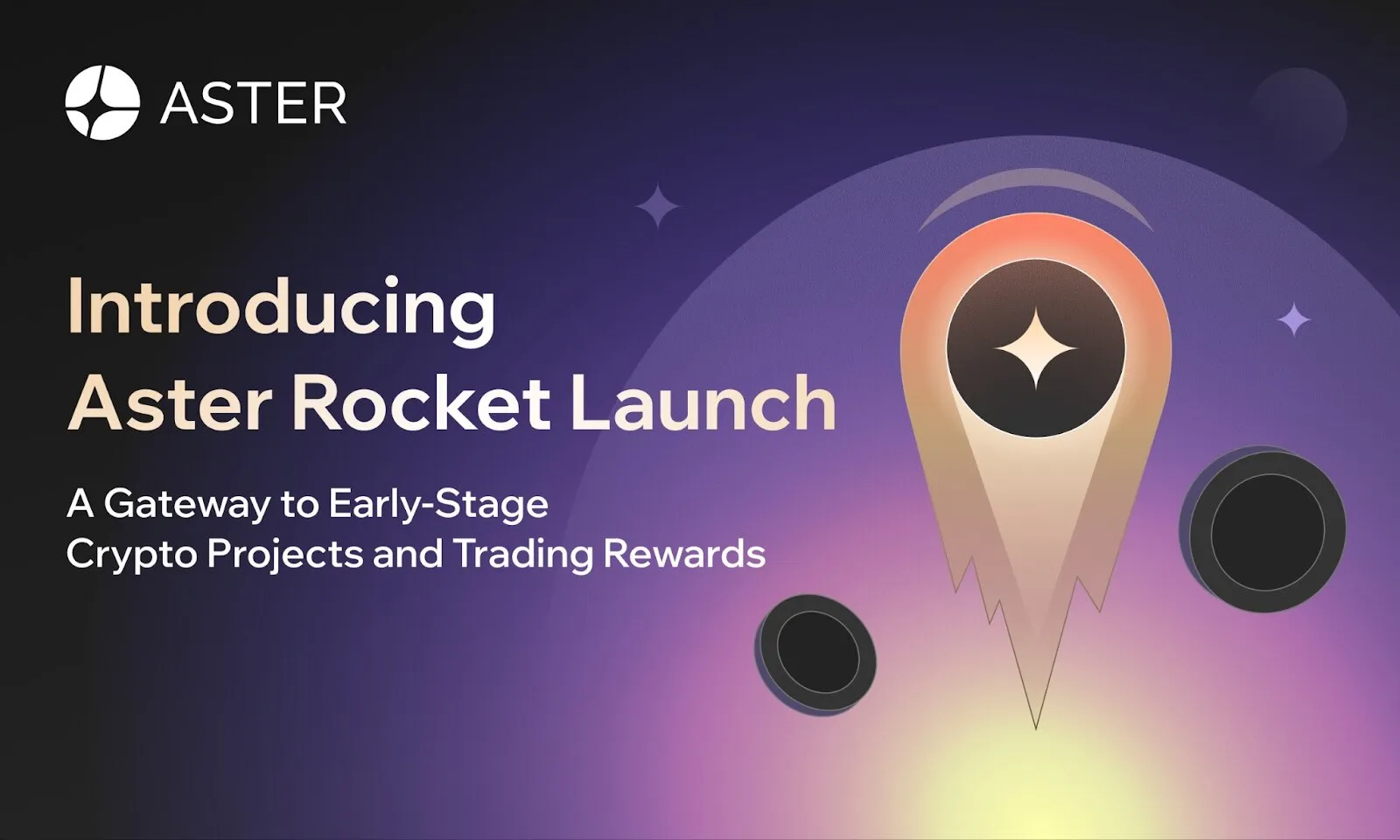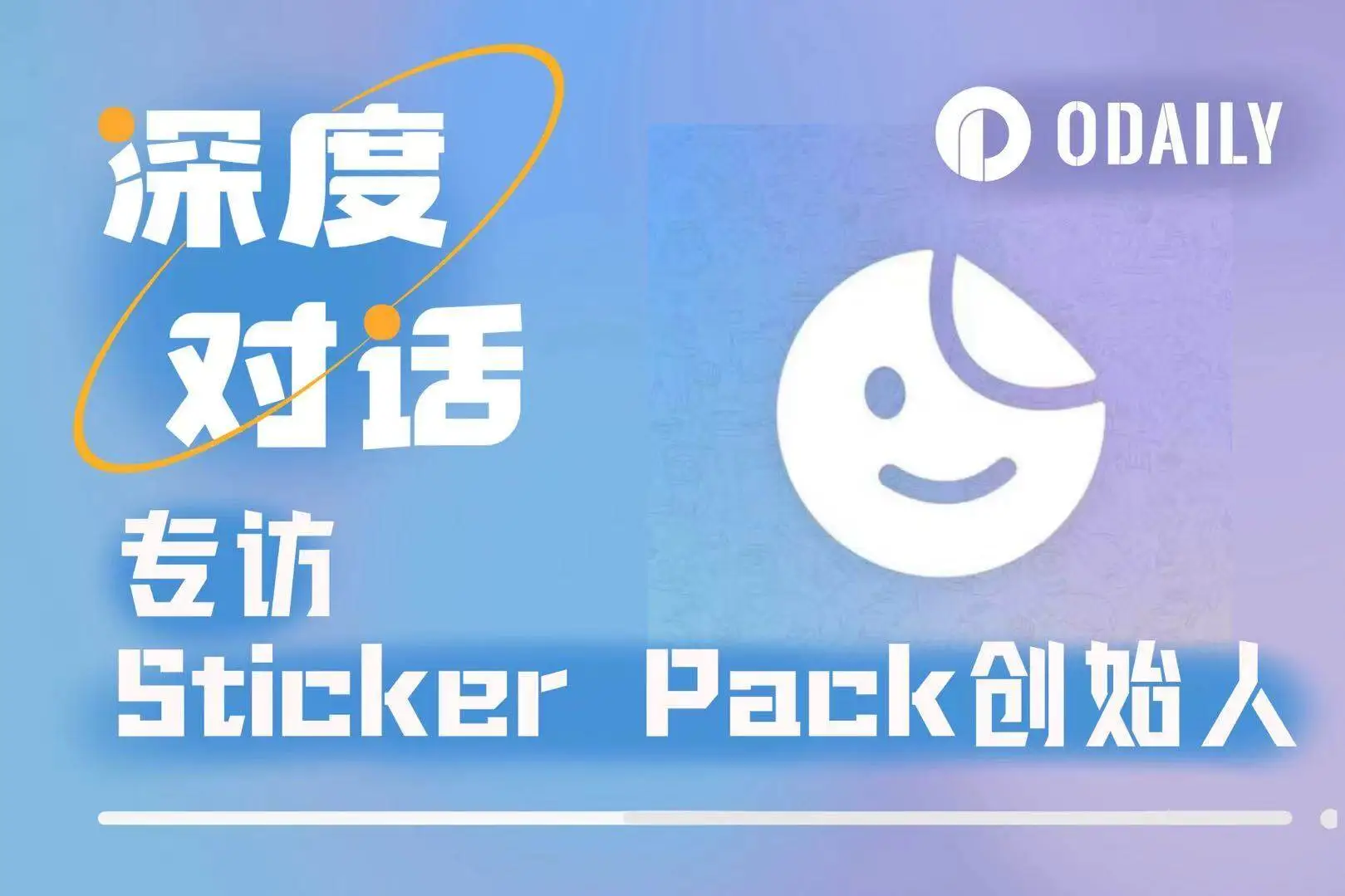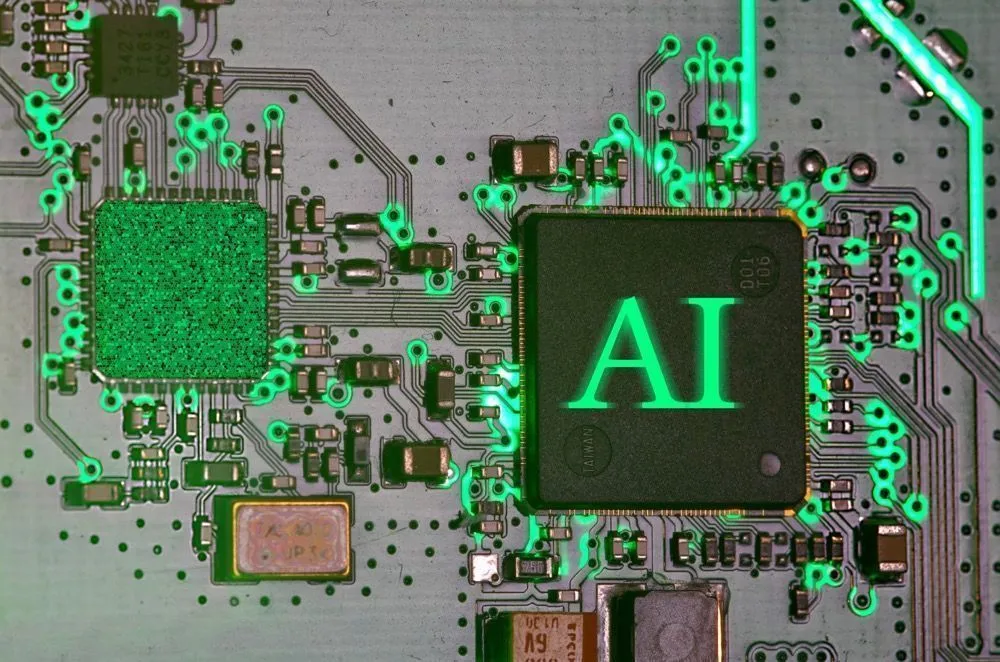Preface: A Key Leap in Reshaping the AI Programming Paradigm
In the current academic and industrial fields, the development of code intelligence agents remains highly fragmented.
Most solutions are either closed or rely on human supervision, with functionalities often limited to specific tasks such as code retrieval, single language support, or simple bug fixes.
Today, Delysium is partnering with Dr. He Ye's team from the Department of Computer Science at University College London (UCL) to initiate a future-oriented software engineering revolution:
To create a truly open, autonomous, multi-language, and cost-efficient AI programming standard and infrastructure.
The core outcome of this collaboration is the newly launched multi-agent system Prometheus, which can abstract complex code repositories into a unified knowledge graph, enabling intelligent problem retrieval and automated solutions (paper link: arXiv:2507.19942).
At the same time, one of the core goals of this collaboration is to open the trained models to the global Delysium community, significantly reducing the operational and deployment costs of large language models. In the future, Delysium will continue to collaborate deeply with EuniAI (UCL SSE team) and several leading industry enterprises to jointly formulate the next generation of AI coding standards based on a unified codebase knowledge graph, continuously producing high-level research results and practical applications with industrial impact.
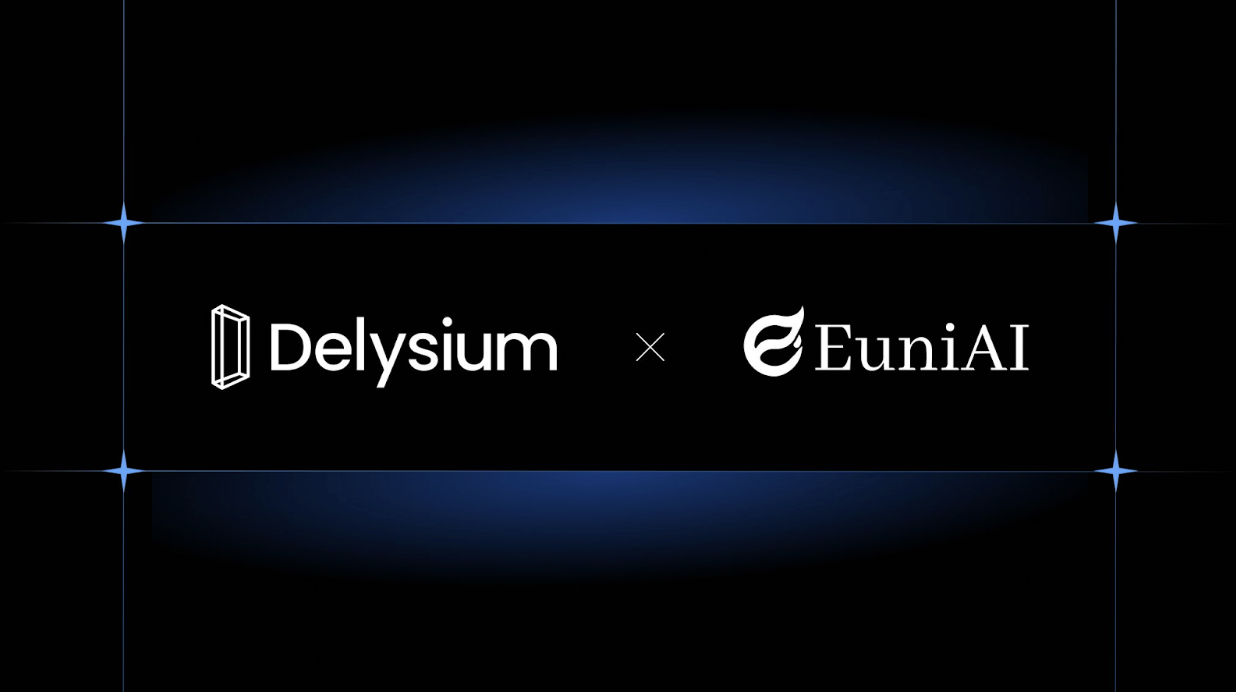
New Paradigm, Greater Efficiency
The focus of this strategic collaboration is to establish an innovative software engineering framework for large-scale, cross-language codebases.
The core methodology is to build a unified knowledge graph, marking a milestone exploration in solving multi-repository issues through graphical structures.
This paradigm shift means that all dispersed code elements, from directory hierarchies and syntax trees to documents and comments, are transformed into inferable graph nodes, becoming a unified knowledge network understandable by agents.
On this basis, the Prometheus multi-agent system was born, capable of transforming complex code repository structures into coherent knowledge graphs, providing strong support for context awareness and efficient problem localization (arXiv:2507.19942).
Prometheus features a language-agnostic architecture, supporting integrated analysis of multi-repository and multi-language projects, greatly expanding the depth of understanding and breadth of decision-making of automated tools regarding code logic.
The system possesses enterprise-level scalability, capable of handling the most complex software ecosystems, laying a solid foundation for the next generation of intelligent development systems.
Open source address: https://github.com/EuniAI/Prometheus

A practical application example that has already been implemented is euni.ai, a project developed based on Prometheus technology, providing intelligent code analysis and automated repair functions.
By deeply understanding the code context, euni.ai can proactively identify and fix issues, significantly enhancing development efficiency and software quality.
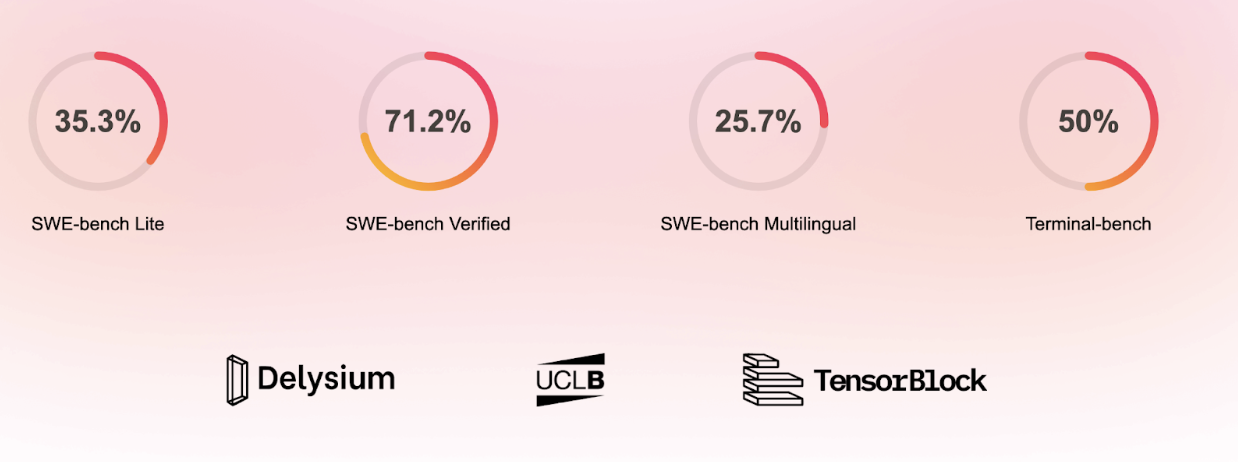
From "Assistance" to "Autonomy": The Full Automation of AI Programming
Relying on Delysium's technological foundation, Dr. He Ye's team has developed a cutting-edge multi-agent system that can automate the handling of various software issues, including bug fixes, feature requests, discussions, and document updates, supporting multiple input forms (text, images, videos, etc.).
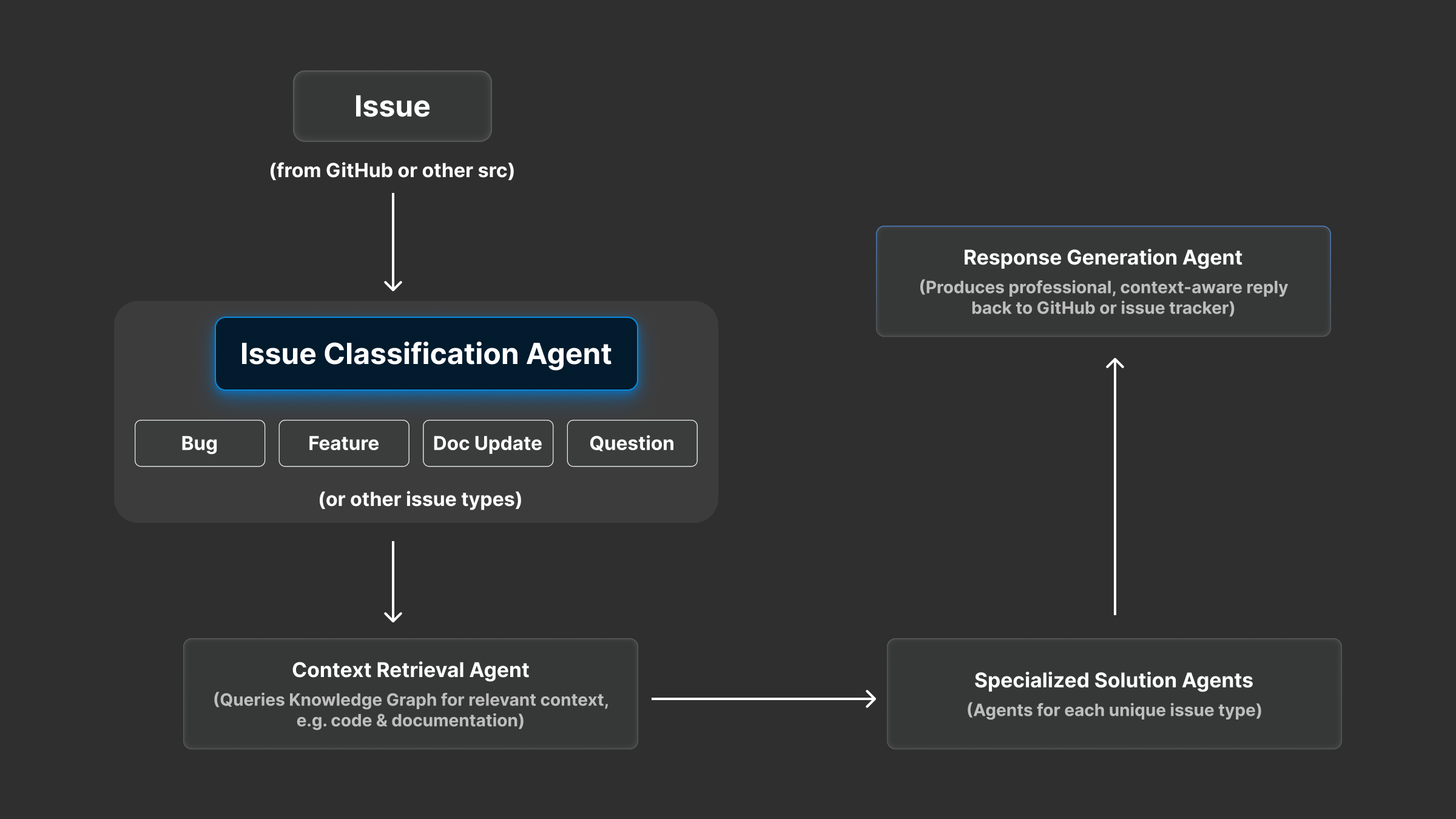
The core of the system lies in two key innovations:
- Deep Context Understanding
- Adaptive Workflow
1. Deep Context Understanding
The system first accurately extracts multi-layer information such as file structures, abstract syntax trees, and documentation from the codebase through the knowledge graph, constructing a multi-dimensional semantic network to achieve a comprehensive understanding of each issue.
Among them, the "Context Retrieval Agent" is responsible for efficiently locating semantically relevant content within the graph, providing solid data support for subsequent reasoning and decision-making.
2. Adaptive Workflow
Each issue, from entering the system to completing the response, is collaboratively handled by multiple agents:
- First, the "Issue Classification Agent" identifies the type (Bug, Feature, Doc, etc.);
- Then, the "Context Retrieval Agent" extracts relevant context;
- The corresponding "Solution Agent" is responsible for executing the issue handling;
- Finally, the "Response Generation Agent" produces specialized replies and automatically publishes them to platforms like GitHub.
This system achieves true "end-to-end automated problem lifecycle management," breaking through the limitations of traditional approaches that are confined to bug fixing.
Breaking Out of "Suggestions" — Entering the Era of "Real Solutions" in AI
Current research such as SWE-agent and OpenHands has made progress on the SWE-bench benchmark, but commercial products remain expensive and closed.
For example, while Claude Code claims to achieve automated issue management, its evaluation costs are extremely high (approximately $1,500 for Claude-Opus-4 to complete 500 SWE-bench tests), with slow responses and a lack of openness and transparency.
Moreover, mainstream systems currently favor Python, with very limited support for other languages; most products focus on bug fixing, with insufficient coverage of feature requests, documentation, and Q&A issues.
Although IDE plugins (like GitHub Copilot), platforms (like Cursor), and general models (like ChatGPT) have entered the market, they still remain in the "assistance" stage rather than achieving full autonomy.
The shortcomings of context retrieval capabilities are also prominent: most are limited to single-file or single-repository levels, lacking cross-repository dependency analysis capabilities.
High computational costs and delays from multiple queries further constrain efficiency and scalability.
In short, while today's AI programming assistants can enhance efficiency, they have not truly achieved cross-language, autonomous, low-cost, and context-complete full-stack decision-making capabilities.
Here is an overview of the current strengths and weaknesses of the AI programming ecosystem: 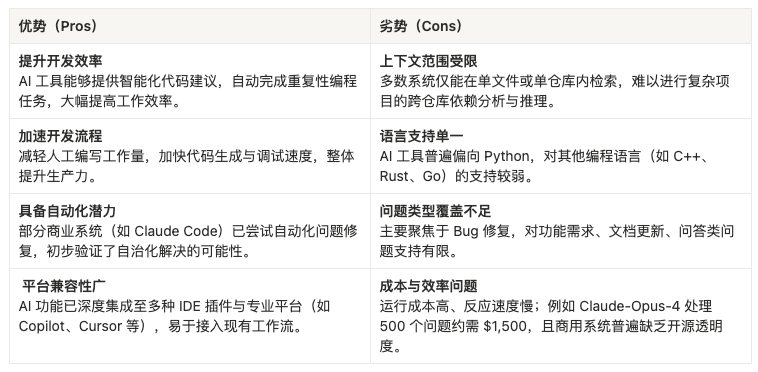
Integrating Academia and Industry: Building a New Foundation for Intelligent Agents
University College London (UCL) is a global hub for artificial intelligence research, renowned for its pioneering collaborations between academia and industry. One of its most representative achievements is the Deep Learning Lecture Series for AI, co-created with DeepMind, which has had a profound impact on global AI academic development.
The Department of Computer Science at UCL has long been at the forefront of international research in artificial intelligence, software engineering, system architecture, and multimodal studies, continuously producing top-tier academic papers and industry-leading research results, known for interdisciplinary innovation.
Within this department, Dr. He Ye leads an innovative AI & SSE (Artificial Intelligence and Software Systems Engineering) team focused on driving systemic breakthroughs in automated software engineering.
The team's research directions include:
- Code Context Understanding
- LLM Enhanced Memory and Reasoning
- Automated Issue Resolution Mechanisms
- Long-term Memory Structures for Agents
These core technologies have been practically validated through open-source collaboration with Delysium and have achieved leading results in SWE-bench benchmark testing.
The latest test results show that the integrated performance based on GPT-5 + Pass@1 ranks among the top globally in the SWE-bench Verified metrics, with the Prometheus intelligent agent system achieving a 71.2% problem resolution rate, ranking 8th globally, just behind OpenHands.
This achievement fully demonstrates the rigorous research methods and engineering production capabilities of the UCL team.
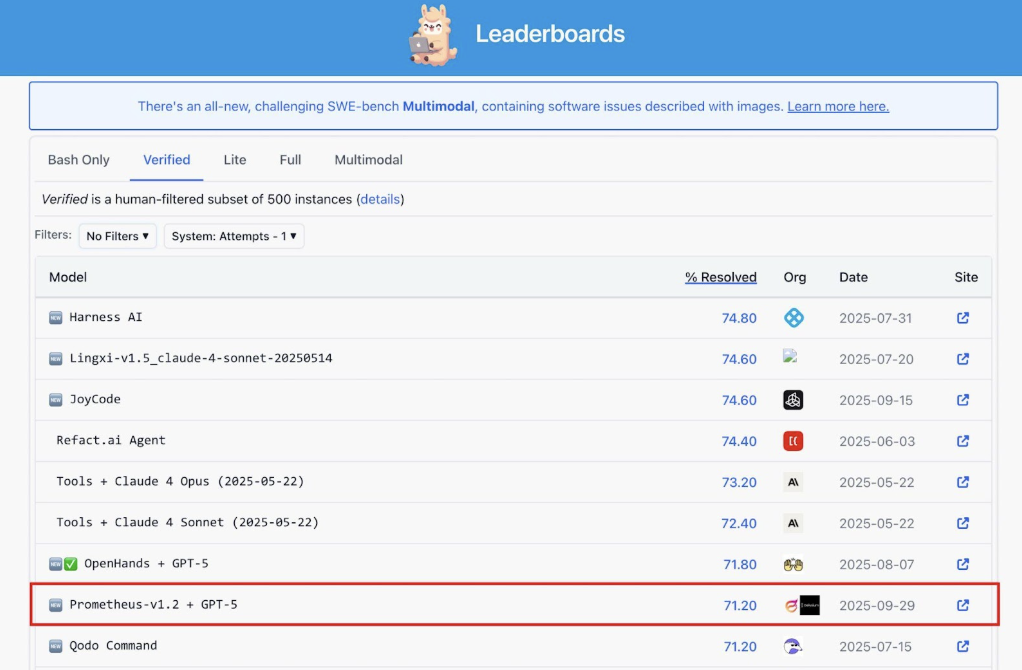
Since 2022, Delysium has steadily established its core position in the industry as a pioneer of blockchain-driven AI intelligent agent networks.
One of its core projects is Lucy (https://www.lucyos.ai) — an agentic operating system designed specifically for the cryptocurrency field, allowing users to freely create, deploy, collaborate, and distribute agents through natural language, achieving efficient co-creation between humans and AI.
At the same time, Delysium has launched the You Know I Love You (YKILY) network — a digital-native financial infrastructure for AI intelligent agents.
This network achieves efficient collaboration among multiple agents, APIs, external services, and models through MCP Aggregators (Multi-Agent Control Protocol Aggregators), building an open, composable, and infinitely scalable ecosystem, laying the foundation for large-scale collaboration in the agent economy.
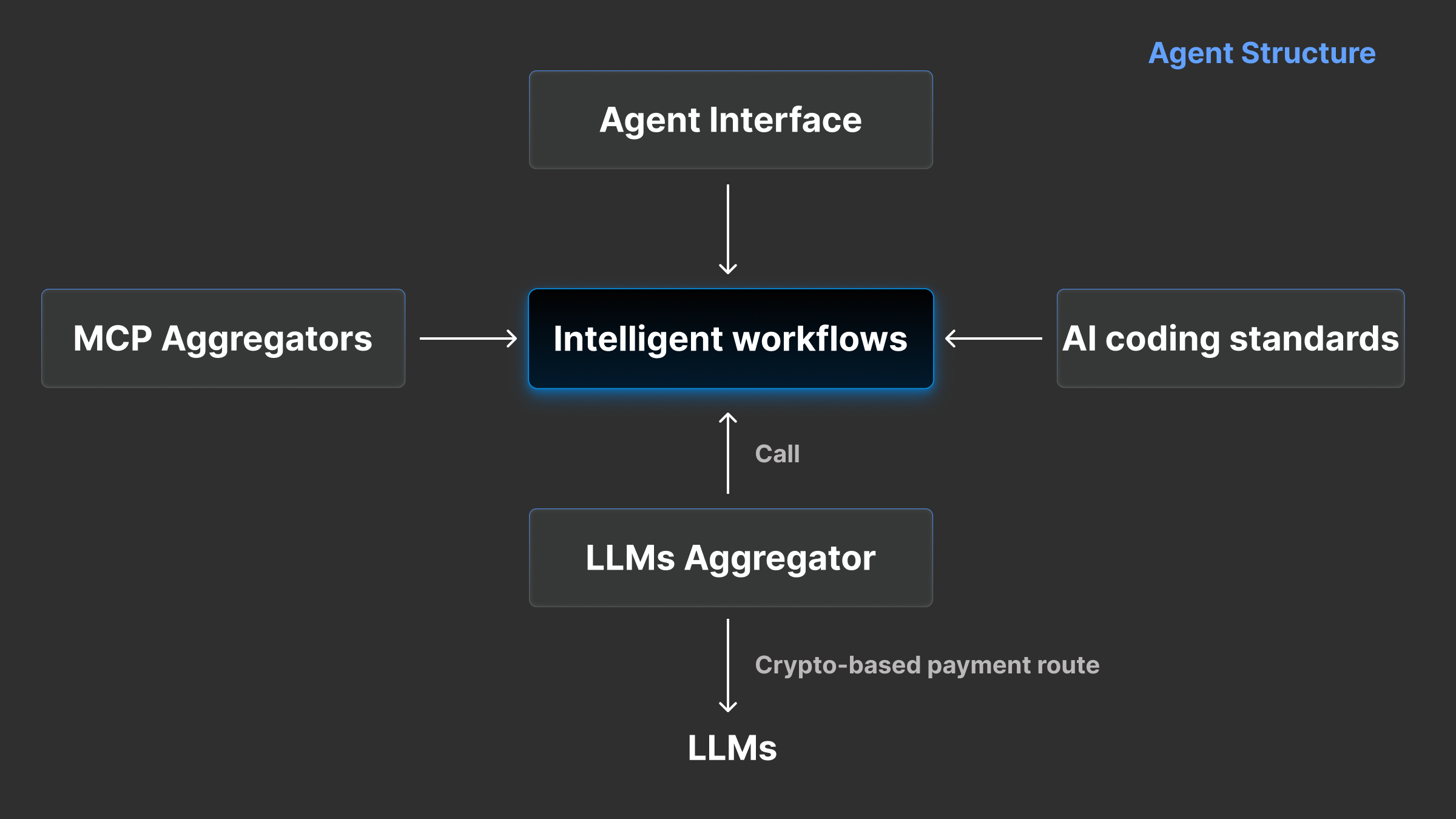
As a core partner, Delysium is committed to continuously enhancing the capabilities of AI agents in problem-solving and use case expansion, promoting a deep integration of AI and the cryptocurrency field.
By jointly establishing an intelligent problem-solving framework and AI programming standard system with University College London (UCL), Delysium is injecting foundational capabilities into its intelligent agent system — Lucy — enabling it to operate and collaborate autonomously in broader and more complex scenarios.
These scenarios extend beyond traditional software engineering to encompass multi-dimensional applications across the entire cryptocurrency ecosystem, including:
- Agent-based cryptocurrency development and code generation
- Agent-driven automated trading and strategy execution
- LLM portals supporting cryptocurrency payments
- MCP aggregators (Multi-Agent Control Protocol Aggregators) serving both traditional and cryptocurrency server environments
These systematic constructions collectively form the next-generation digital-native infrastructure promoted by Delysium — the You Know I Love You (YKILY) network. This network aims to provide AI agents with an open, composable, and scalable foundational collaboration environment, allowing agents to transcend single tasks and autonomously collaborate and evolve across the boundaries of cryptocurrency, AI, and distributed computing.
From "Assistants" to "Creators": The Future of AI Programming Has Arrived
The collaboration between Delysium and UCL marks a turning point in the field of AI programming from "tool-based" to "autonomous."
Both parties will promote industrial standardization through open research and feed back academic innovation with open-source technology, using AI's reasoning and self-iteration capabilities to make "code" a thinking entity.
This is not only a fusion of technology but also an evolution of ideas.
In such a future, AI will no longer just be an assistant that "helps you write code," but a creative partner that can actively solve problems, understand context, and participate in innovation.
The collaboration between Delysium and UCL signifies a shift in the AI programming field from "tool-based" to "autonomous," representing not only a technical alliance but also an interweaving of vision, philosophy, and business insights.
In an industry landscape fragmented by closed protocols, both parties are weaving together an open, autonomous, cross-language, and cost-effective AI ecosystem — evolving code intelligence from "suggestions" to "real solutions," making "code" a thinking entity.
This collaboration, which integrates academic rigor with industrial innovation, will become an evolution of ideas, laying the foundation for the next wave of digital transformation.
Future developers will no longer be burdened by debugging; agents will become their creative partners — driving innovation through reasoning, collaboration, and adaptability.
The future of AI programming is already on the way — no longer a sci-fi blueprint, but gradually realized with every line of intelligent code.
About Delysium
Delysium ($AGI) is dedicated to building a blockchain-based AI agent collaboration network, with its core ecosystem including: Lucy (www.lucyos.ai): Agentic Operating System, and the You Know I Love You (YKILY) network: a digital-native financial infrastructure for AI agents.
- Official website: www.delysium.com
- White Paper V2: delysium.gitbook.io
- X (formerly Twitter): x.com/The_Delysium
- Telegram: t.me/TheDelysium
- Discord: discord.gg/thedelysium
In the upcoming era of intelligent agents, software will no longer wait to be instructed but will evolve alongside humans through understanding, decision-making, and creation.
免责声明:本文章仅代表作者个人观点,不代表本平台的立场和观点。本文章仅供信息分享,不构成对任何人的任何投资建议。用户与作者之间的任何争议,与本平台无关。如网页中刊载的文章或图片涉及侵权,请提供相关的权利证明和身份证明发送邮件到support@aicoin.com,本平台相关工作人员将会进行核查。
